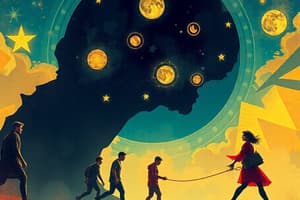Podcast
Questions and Answers
What does the term 'medium' refer to in communication studies?
What does the term 'medium' refer to in communication studies?
- A specific theory of communication
- A metaphor for interpersonal communication
- A type of communication channel
- A singular media entity (correct)
Which of the following is a component of Lasswell's formula for analyzing communication?
Which of the following is a component of Lasswell's formula for analyzing communication?
- Where
- When
- What (correct)
- Who influences
In the communication pyramid proposed by McQuail, which level is at the top?
In the communication pyramid proposed by McQuail, which level is at the top?
- Group
- Intrapersonal
- Societal (correct)
- Institutional
Which type of communication involves thinking about someone's actions without verbal interaction?
Which type of communication involves thinking about someone's actions without verbal interaction?
What is a characteristic of normative theories in media studies?
What is a characteristic of normative theories in media studies?
Why do everyday theories matter in decision-making?
Why do everyday theories matter in decision-making?
What does a scientific theory provide in communication studies?
What does a scientific theory provide in communication studies?
What aspect does the theory of survivor bias focus on?
What aspect does the theory of survivor bias focus on?
What is a key component that distinguishes communication in contemporary society?
What is a key component that distinguishes communication in contemporary society?
How has the definition of communication evolved over time?
How has the definition of communication evolved over time?
Which invention marked a significant advancement in long-distance communication?
Which invention marked a significant advancement in long-distance communication?
What aspect of communication was significantly impacted by the cognitive revolution?
What aspect of communication was significantly impacted by the cognitive revolution?
What significant transition in communication can be traced from prehistoric times to modern society?
What significant transition in communication can be traced from prehistoric times to modern society?
What is considered the first form of long-distance communication?
What is considered the first form of long-distance communication?
Which term describes the action of facilitating social relationships among humans?
Which term describes the action of facilitating social relationships among humans?
What term reflects the change in the concept of communication from the Renaissance to the contemporary age?
What term reflects the change in the concept of communication from the Renaissance to the contemporary age?
What characterizes operational theories compared to normative theories?
What characterizes operational theories compared to normative theories?
Which term refers to the media's decision to limit coverage based on certain political ideologies?
Which term refers to the media's decision to limit coverage based on certain political ideologies?
What do social-scientific theories aspire to achieve?
What do social-scientific theories aspire to achieve?
How does the 'structure vs. agency' debate conceptualize social change?
How does the 'structure vs. agency' debate conceptualize social change?
What is a significant characteristic of the liberal paradigm in social sciences?
What is a significant characteristic of the liberal paradigm in social sciences?
What best describes paradigm shifts in science?
What best describes paradigm shifts in science?
Which of the following theories focuses on material factors in social change?
Which of the following theories focuses on material factors in social change?
What is a common goal of both the liberal and critical paradigms?
What is a common goal of both the liberal and critical paradigms?
Flashcards
Cognitive Revolution
Cognitive Revolution
The ability to communicate, especially through language, allowed humans to develop complex societies, complex rituals, and express abstract thoughts.
Evolution of Communication
Evolution of Communication
The development of more sophisticated forms of communication, including language, writing, and technology, which influence how humans interact with each other and the world.
What is Communication?
What is Communication?
The process of conveying information between individuals or groups, including verbal, nonverbal, and written forms.
Sharing Information
Sharing Information
Signup and view all the flashcards
Transmitting Information
Transmitting Information
Signup and view all the flashcards
Social Relations
Social Relations
Signup and view all the flashcards
Information
Information
Signup and view all the flashcards
Changing Meaning of Communication
Changing Meaning of Communication
Signup and view all the flashcards
Normative Theories
Normative Theories
Signup and view all the flashcards
Operational Theories
Operational Theories
Signup and view all the flashcards
Social-Scientific Theories
Social-Scientific Theories
Signup and view all the flashcards
Agency
Agency
Signup and view all the flashcards
Materialist Theories
Materialist Theories
Signup and view all the flashcards
Cultural Theories
Cultural Theories
Signup and view all the flashcards
Paradigms
Paradigms
Signup and view all the flashcards
Paradigm Shift
Paradigm Shift
Signup and view all the flashcards
Communication Science (C-S)
Communication Science (C-S)
Signup and view all the flashcards
Mcquail's Pyramid of Communication
Mcquail's Pyramid of Communication
Signup and view all the flashcards
Theory in Communication Science
Theory in Communication Science
Signup and view all the flashcards
Everyday Theories
Everyday Theories
Signup and view all the flashcards
Interpersonal Communication
Interpersonal Communication
Signup and view all the flashcards
Intrapersonal Communication
Intrapersonal Communication
Signup and view all the flashcards
Communication Science
Communication Science
Signup and view all the flashcards
Study Notes
Part 1: The History of Communication
-
What makes us human?
- Culture, religion, technology, work, tradition, norms and laws, art, language, abstract thinking, planning depth, and complex rituals are all aspects of human existence.
-
Cognitive Revolution
- The cognitive revolution is a massive increase in communication complexity, which led to behavioral modernity.
-
What is communication?
- Communication is defined as the means by which humans, and humans with objects, interact. Information is an object which can circulate through social relations.
- Different perspectives on the definition of communication exist, with historical shifts in meaning.
-
Communication Eras
-
(100) Latin: communicationem = action.
-
(1500) Renaissance: com = object.
-
(1700) Modern age: communication lines = means.
-
(1900) Contemporary age: com = maintaining social contact/media (e.g., radio, television).
-
Today: communication = difference between transmitting (one-to-another) and sharing (e.g., social media) information.
-
Evolution of Communication Forms
- Humans communicated through speech.
- Then, writing developed.
- Smoke signals were the first form of long-distance communication.
- Painting and art in prehistory were communications forms to capture reality, as they remain today.
- Inventions like paper (105), the telephone (1876), email (1965), Facebook, Instagram, and Twitter (2004-2009) are also significant communication developments.
- Communication methods continue to evolve, and the meaning of "communication" shifts along with it.
The Science of Communication
-
Communication as a Science
- The science of communication involves trying to understand communication through observation of millions of situations and experiences. Learning from the experiences of societies helps to understand broader trends in human communication. The general knowledge gained can be used to further the understanding of situations.
- Examples are popular videos and their virality.
-
General Questions to analyze comm
- What?
- Who?
- Why?
- To whom?
- How?
-
Communication Theories and Concepts
- Theories are general perspectives on and ways of thinking about a specific topic, e.g., the theory of gravity or survivor bias.
- They offer ways to understand the world. They are often limited but offer particular viewpoints.
- Theories in communication help us make sense of how communication works. Examples include the concepts of communication and their definitions.
-
The Pyramid of Mcquail (2010)
- Societal -> institutional -> group -> interpersonal -> intrapersonal.
-
Operational Theories
- Building on normative theories, these theories focus on real-world applications and actions, being more grounded in the world.
-
Social-Scientific Theories
- These focus on understanding how the world actually operates logically and rationally.
- These aren't necessarily value-neutral views of reality.
-
Scientific Debates
- Structure vs. Agency: This debate explores how much of human behavior is determined by external structures and the choices individuals make.
- Social change.
- Materialist theories focus on material factors.
- Cultural theories focus on ideas.
-
Paradigms
- Paradigms are groups of theories that share similar assumptions or viewpoints which help scientists understand communication. Changing paradigms can be like a scientific revolution in the field.
Paradigm Change
- Liberal Paradigm: Focuses on practical, concrete solutions, often having a positive view.
- Critical Paradigm: Aims to improve society by considering different viewpoints and power structures and can be more ideological.
Studying That Suits You
Use AI to generate personalized quizzes and flashcards to suit your learning preferences.




